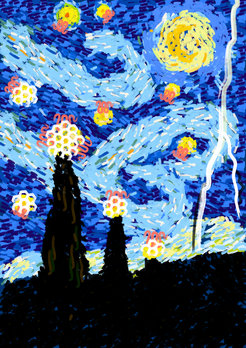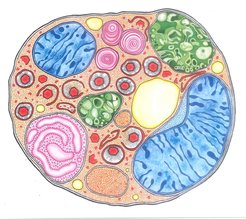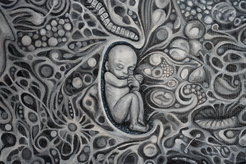
Max Planck Art & Science Day
On November 29, 2023, for researchers and for everyone interested in science and art
What is autophagy? How do our cells remove their waste? How can we combine art and science? How can research be represented artistically? Visit us, learn, explore and be creative!
Program
Scientific Symposium on Autophagy: 9:00 am – 2:30 pm
Art & Science for Everyone! Creative Workshops for All Ages, Talks: 2:30 pm – 6:00 pm
Vernissage Art & Science Exhibition with Live Music: 6:00 pm
Venue:
Max Planck Institute of Biophysics, Max-von-Laue-Straße 3, 60438 Frankfurt am Main
Contact and more information: pressestelle@biophys.mpg.de
Scientific symposium
“Autophagy – Survival through Self-digestion”
9:00 am – 2:30 pm | venue: lecture hall (room 0.01), 1st floor
Chair: Gerhard Hummer
Subject to change without notice.
9:00 am
A Computational View of Autophagy in Action
Gerhard Hummer
Max Planck Institute of Biophysics, Frankfurt am Main, Germany
9:30 am
The Molecular Acrobats of Autophagy
James Hurley
University of California, Berkeley, USA
10:00 am
Ultrastructural Analysis of Autophagy Using Correlative cryo-Electron Tomography
Florian Wilfling
Max Planck Institute of Biophysics, Frankfurt am Main, Germany
10.30 am: Coffee break
11:00 am
Selective Microautophagy of the Endoplasmic Reticulum
Sebastian Schuck
University of Heidelberg, Germany
11:30 am
Regulation and Modulation of ER-phagy
Alexandra Stolz
Goethe University, Frankfurt am Main, Germany
12:00 pm
Selective Autophagy in Health and Disease
Ivan Đikić
Goethe University, Frankfurt am Main, Germany
12.30 pm: Lunch break
1:30 pm
Removal of Dysfunctional Mitochondria by Mitophagy
Christian Münch
Goethe University, Frankfurt am Main, Germany
2:00 pm
Atg8 - LIR Peptide Interactions and Their Modulation by Phosphorylation Are Essential for Autophagy
Volker Dötsch
Goethe University, Frankfurt am Main, Germany
Art & Science for Everyone!
Creative Workshops for all Ages
2:30 pm – 6:00 pm | venue: foyer

Join our researchers and artists to draw comics, model proteins out of clay, paint colorful cells, examine scientific samples, and learn what light and electron microscopy images look like!
In our foyer, a market with fun hands-on stations will await you all afternoon. Come by whenever you want and become creative: Experiment with researchers from our institute, draw comics about the cell and its recycling system with Ariane Pessentheiner and paint and model proteins and cells with Dorotea Fracchiolla and Ayelén Valko.
Furthermore, you may learn more about how our cells recycle their waste. In a process called autophagy, they degrade defective or damaged cellular building blocks, ensuring the cell’s survival. Check out how researchers can observe this process.
Talks
Learn more about science and art and the recycling mechanisms of our cells in exciting talks:
2:30 pm
The Science of Art: Making Ideas Visible
Dorotea Fracchiolla
Molecular Biologist, Illustrator and Artist
(Talk in English)
3:00 pm
The Art of Science: Finding Artistic Inspiration in the Cellular Universe
Ayelén Valko
Cell Biologist and Visual Artist
(Talk in English)
3:30 pm
Wissenschaft im Comic – ein Zugang zu komplexen Themen
Ariane Pessentheiner
Biochemist, Science Communicator and Artist
(Talk in German)
4:00 pm
Wie die Zelle ihren Müll entsorgt
Fabian Fiedler
PhD Student Researcher at the Max Planck Institute of Biophysics, Frankfurt am Main, Germany
(Talk in German)
Art & Science Exhibition
“Autophagy Unveiled on Canvas: on the Art & Science of Self-Degradation”
Exhibition until February 2024
Vernissage on November 29, 2023 at 6:00 pm | venue: foyer
Live Music with Cozy Atticus

This visual journey is centered around the fascinating world of autophagy – a crucial biological process. During autophagy, cells respond to stress stimuli by embarking on a self-eating mechanism to ensure their survival. This paradox phenomenon – a degradative process and yet vital – possesses a philosophical beauty: it mirrors the delicate equilibrium governing life, resonating from individual cells to entire ecosystems. This intriguing biological dance inspired the artists and scientists Dorotea Fracchiolla and Ayelén Valko, who employ a wide array of resources and techniques to craft their artwork. Deliberately using metaphors and symbolisms, the artists enhance the emotional links with the artworks, and make biological knowledge accessible across dimensions – from from tissues and cells to the very molecules that shape them.

Click here to take a glimpse at the artworks that await you!
The Artists
Dorotea Fracchiolla, an Italian-born scientist, holds a lifelong passion for visual arts and communication. She earned her degree in Medical Biotechnology from the Catholic University of the Sacred Heart in Rome and the University of Bari "Aldo Moro". Her Doctoral studies at the University of Vienna led her to the lab of Prof. Sascha Martens, where she delved into selective autophagy in budding yeast. Currently, she works as a scientist and a freelance artist, as new scientific discoveries continue feeding her artistic intuition. Guided by the motto “If you can draw it, you have understood it to the very detail”, Dorotea finds joy in collaborating with other scientists to illustrate their science and help them elaborate new questions and research avenues.

Ayelén Valko is an Argentine artist and cellular biologist exploring the intersection of art and science. After studying Biology at the University of Buenos Aires, she completed her Ph.D. at the Leloir Institute in Argentina. She joined Sebastian Schuck’s Laboratory at Heidelberg University as a postdoctoral fellow, a journey that continued until late 2022. In parallel to her scientific education, she was trained in different art techniques at the National University of Art in Argentina, and subsequently, she specialized in scientific and naturalistic illustration. Currently, she is focused on creating science-inspired cover images for scientific journals, curating exhibitions, spearheading science popularization initiatives, and writing articles that interweave art and science.
Cozy Atticus is a molecular biologist and composer for classical guitar and string ensembles who was born and raised in Athens (Greece). His musical landscapes portray the melancholic shade(s) of art. Within an ethereal plane of arpeggios, his dark complexion of aesthetics encodes elegant stories of the human condition in order to remind us of the sublime; all the things that we don’t know that we know.









